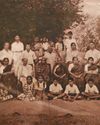Poging GOUD - Vrij
Breathe the Poetic Breeze of Bombay
Outlook
|September 21, 2023
Reading verses of poets who trained the lens on erstwhile Bombay during poetry walks provides a new dimension to understanding their work

Driven from his bed by troubled sleep In which he dreamt of being lost Upon a hill too high for him (a modest hill whose sides grow steep) He stood where several highways crossed
And saw the city, cold and dim, Where only human hands sell cheap
-Nissim Ezekiel, A Morning Walk
A group of 10 people stand on the rain-dappled street on a Sunday morning with paper sheets clutched in their hands. The assembly point, in front of a very tall luxurious building, is significant for the group. The uber-chic skyscrapers in the background tell the urban tale of development that Mumbai has been witnessing over the past decade. These skyscrapers—located on land that housed mills in a bygone era and fell silent following the 1982 textile strike called by unionist Datta Samant— are a stark contradiction to the low-walled, small tenements or chawls that were once an intrinsic part of the landscape here. In this transition from Bombay to Mumbai, the quaintness of the former is fighting a losing battle against the aggressive rapid growth of the latter.
On that Sunday morning, braving the slight drizzle, the group led by Saranya Subramanian, is trying to revisit the abandoned histories of mills and the chawls that sheltered the mill workers, through a poetry crawl. Walking through a preplanned route, Saranya has chosen the poems carefully. They have to resonate with the theme for that day: From Malls to Mills—the Abandoned Histories Poetry Crawl. Standing in a semi-circle, the group reads a translated version of poet Narayan Surve’s Char Shabd
Dit verhaal komt uit de September 21, 2023-editie van Outlook.
Abonneer u op Magzter GOLD voor toegang tot duizenden zorgvuldig samengestelde premiumverhalen en meer dan 9000 tijdschriften en kranten.
Bent u al abonnee? Aanmelden
MEER VERHALEN VAN Outlook

Outlook
One Hundred Years Of... Creating Heroes
Madhav Sadashiv Golwalkar, the second sarsanghachalak (or chief) of the Rashtriya Swayamsevak Sangh (RSS), was possibly the most complicated and contradictory figure of modern India.
4 mins
October 21, 2025

Outlook
The Lesser Halves
At Rashtra Sevika Samiti shakhas, women are offered empowerment—but only to a certain extent. Their roles remain largely defined: mothers, cultural custodians and loyal citizens
10 mins
October 21, 2025
Outlook
The Thought of the Sangh Is Synonymous with Hindutva Thought
OUR work is fundamentally man-making. Swayamsevaks have entered and started working in almost all walks of our social life. They have also built various organizations and institutions. All these organizations and institutions are independent, autonomous and self-reliant. None of these organizations or institutions is run according to the decisions taken at the meetings of the Sangh. These have been started by our swayamsevaks on their own accord, and they also run them without depending on others. They keep in touch with the Sangh and also get suggestions and cooperation. The swayamsevaks also develop the sense to extend cooperation to whoever is doing some good work with honesty for the sake of society, irrespective of whether they are our supporters or opponents. Questions concerning the relationship between the Sangh and politics are being raised time and again. Is the Sangh nurturing any political ambition? The common trend nowadays is that when a person acquires capabilities and creates their own identity in the field that helped them achieve their capabilities, they will be keen on joining politics. However, the work of the Sangh is to organize the entire society. Politics, political parties and the work of organizing the society can go together only to a limited extent. Hence, the Sangh has, from the very beginning, made a strong resolve to keep itself away from politics. The Sangh will never involve itself in competitive politics, will never fight elections and the office-bearer of the Sangh will never take up any official responsibilities or positions in any political party. The Sangh will always keep itself aloof from politics.
3 mins
October 21, 2025

Outlook
One Hundred Years Of... The 'Shri Shakti' Element
For decades, a substantial number of women have been working in all the RSS-inspired organisations, with several of them holding prominent posts and playing leadership roles. The numbers are only going up
7 mins
October 21, 2025

Outlook
One Hundred Years Of... Shadow Dance
The RSS and it shadow outfits have lauded Sufi practices and tapped the Muslims in Kashmir but political parties in J&K allege that they are claiming a bogus association with the Valley
5 mins
October 21, 2025

Outlook
Trump's Tariff War - Donald Trump Deserves Nobel Prize In Economics
Trump, nominated for the Nobel Peace Prize, defies free trade norms with tariffs on allies and rivals, shaking global trade systems through his unpredictable, mercantilist-style policies
2 mins
October 21, 2025
Outlook
One Hundred Years of...Growth and Success
Shared ideas and unimaginable patience in its ambitious mission, along with uncontested moral upbringing of its cadres, has ensured the success of the RSS
9 mins
October 21, 2025

Outlook
One Hundred Years Of... Being a Lesser Hindu
He joined the Rashtriya Swayamsevak Sangh (RSS) during his teenage years and rose in the organisation’s ranks. During the Babri Masjid demolition movement, he joined the karsevaks to go to Ayodhya. His arrest became a turning point of his life, prompting him to question the RSS’ casteist realities, and eventually leave the organisation. He founded platforms such as Diamond India, Khabarkosh and Shoonyakaal to amplify marginalised voices. He has also worked with the Mazdoor Kisan Shakti Sangathan and played an important role in implementing laws such as RTI, NREGA and the Food Security Act. His book I Could Not Be Hindu (originally written in Hindi as Main Ek Kar Sevak Tha) has been translated into multiple languages. Meghwanshi spoke to Jagisha Arora about his eventful journey. Excerpts:
2 mins
October 21, 2025

Outlook
One Hundred Years Of... The Deep State
Ambedkar remains, and will continue to be, the biggest roadblock to the Rashtriya Swayamsevak Sangh's (RSS) efforts to saffronise the Dalits, says Christophe Jaffrelot—a professor of Indian politics and sociology at King's India Institute, London—in an interview with Outlook editor Chinki Sinha.
8 mins
October 21, 2025

Outlook
One Hundred Years Of... The Adivasi Quandary
RSS' Vanvasi Kalyan Ashram works in the fields of education, health and rural development. However, the cultural homogeneity of tribals as Hindus is at the core of its agenda
7 mins
October 21, 2025
Translate
Change font size
